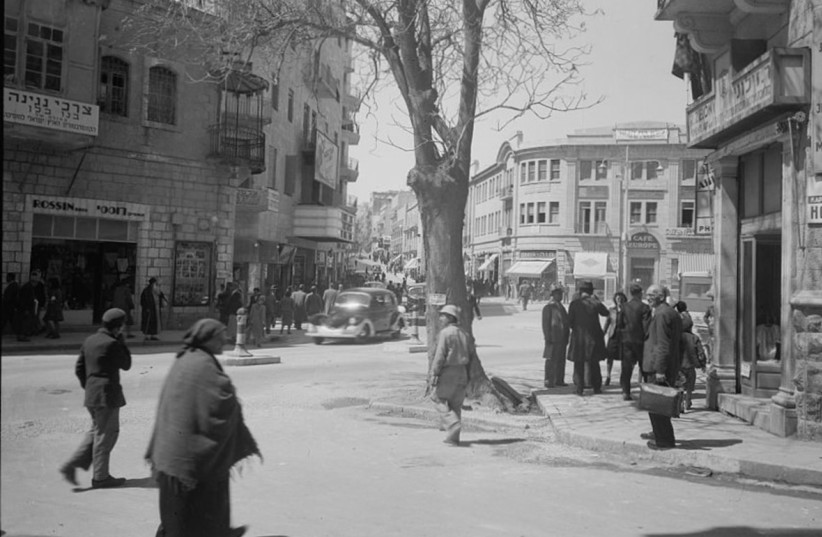As The Wealthy begins, a tall, bearded man, “whose chest and privates are covered by graying hairs,” approaches Meyer Heimstatt, in a steam room.
“Are you from Kassel?” Abraham Edelstein asks. “I haven’t seen you in our synagogue.” Meyer indicates that he is a peddler from Trendelburg, who sells books, newspapers and secondhand clothes, and quickly accepts Edelstein’s invitation to join his family for the last meal before the Yom Kippur fast.
“Heimstatt. Homeland. Birthplace,” Abraham muses. “Is your homeland Prussia?” “Homeland is where you feel at home,” Meyer replies. “Homeland is where they feel that they like you,” Aaron Edelstein, Abraham’s son, chimes in. “Feeling is a personal matter,” says Abraham. “We do not live by feeling but by reason.”
A professor emeritus of Hebrew literature at Ben-Gurion University of the Negev, Hamutal Bar-Yosef is a distinguished scholar, whose collections of poetry and stories have been translated into numerous languages. In The Wealthy, her first novel, Bar-Yosef follows six generations of Heimstatts as they search for a homeland in Poland, Prussia, England, Mandatory Palestine and Eretz Yisrael. Along the way, she describes Jewish life in Eastern Europe; the science and economics of acid rain and nickel; British royalty and party politics; art and literature; antisemitism; Mandatory Palestine; and conflicts between reason, faith and feelings.
Bar-Yosef’s didactic approach, alas, often comes at the expense of novelistic artistry. Her characters do not converse with one another; they declaim. “I’ll tell you,” Harold tells Claire Heimstatt, just before their wedding, “I don’t believe in any religion. I am an atheist, basically. Like Huxley, I believe that there are limits to human understanding. Theology is outside those limits. Whatever there is beyond life and death, I neither know nor care.”

Bar-Yosef provides extended excerpts from Why Does The Christian Hate the Jew? (a book Albert Heimstatt is reading), Land Reform and Development in the Middle East (a book Richard Heimstatt is reading), and other texts.
She drops the names of worthies – Israel Gollancz, Siegfried Wagner and Gabriele D’Annunzio- who attend Gotthold Heimstatt’s 60th birthday party; Henry James, Arthur Symons and Israel Zangwill, who join Violette Heimstatt’s salon; and Thomas Tallis and Hector Berlioz, Harold’s favorite and most difficult-to-comprehend composers.
During the section on Mandatory Palestine, the Heimstatts drop out of sight for extended periods of time.
That said, Bar-Yosef’s treatment of challenges facing Diaspora Jews is not less emotionally evocative because they are familiar.
“Maybe you should stop going around with the cart, become a farmer and be home every night,” Herte Heimstatt tells Meyer. “A Jew can manage to live somehow in a gentile village,” her husband replies, “but if he wants to be a farmer, he’ll have to stop being a Jew.”
Minna “runs her eyes over the vast ceiling decorated with baroque-style bas reliefs,” walls covered with expensive paintings, carpets and the landscape surrounding Knowsley Hall, her home, and tells Gotthold Heimstatt, her husband, that as time passes, she is increasingly aware of her human surroundings: “This place is very beautiful, but I feel so alone.”
Richard, who has married a non-Jew, feels Jews have “a special talent” for adjusting to countries in which they live. Convinced that religion “has given the world only trouble,” he vows that his children should decide whether they want to be Jews when they grow up. Richard promises his father he will say kaddish for him. At the Jewish cemetery, where he has never been before, he recites the prayer “and feels nothing.”
At roughly the same time Richard’s daughter notices that Jews are hastening to get rid of their German surnames. However, Claire fears that an English-born child “will hear from his nurse that Jews are a strange race with big hook noses, who are greedy and stingy. He won’t have any reason to think he has any connection with them, until he finds out by chance.”
Richard and his children do not shed their secular orientation. But in Mandatory Palestine they embrace their Jewish identity. “Spiritual subjects have no place either in manufacturing operations or in the House of Commons,” Richard declares, “but when I come here I feel a great weight is lifted from my shoulders.” Here, he no longer must “care at every moment not only to act but feel completely English, to forget that I am a Jew, to be different from my father, my grandfather.”
The Wealthy ends with an analysis of the conflict between Arabs, Bedouin, Brits and Jews in Mandatory Palestine that is, well, less than even-handed. With celebrations marking the establishment of the State of Israel, Chaim Weizmann’s observation that the greatest asset of Jews is “restlessness and impatience,” and his hope that “we will never settle down too much.”
Fair enough. But a concern raised by Ralph Heimstatt, by then an ardent Zionist, seems at least as prescient. “How do you measure injustice?” Richard’s son asks. “How do you measure pain? In inches or ounces?
“Do you have an instrument to measure precisely and evenly the injustice that was done to you and the injustice you have done to others?”
The writer is the Thomas and Dorothy Litwin Professor of American Studies at Cornell University.
The Wealthy
By Hamutal Bar-Yosef
Translated by Esther Cameron
Gefen Publishing House
475 pages; $29.95
